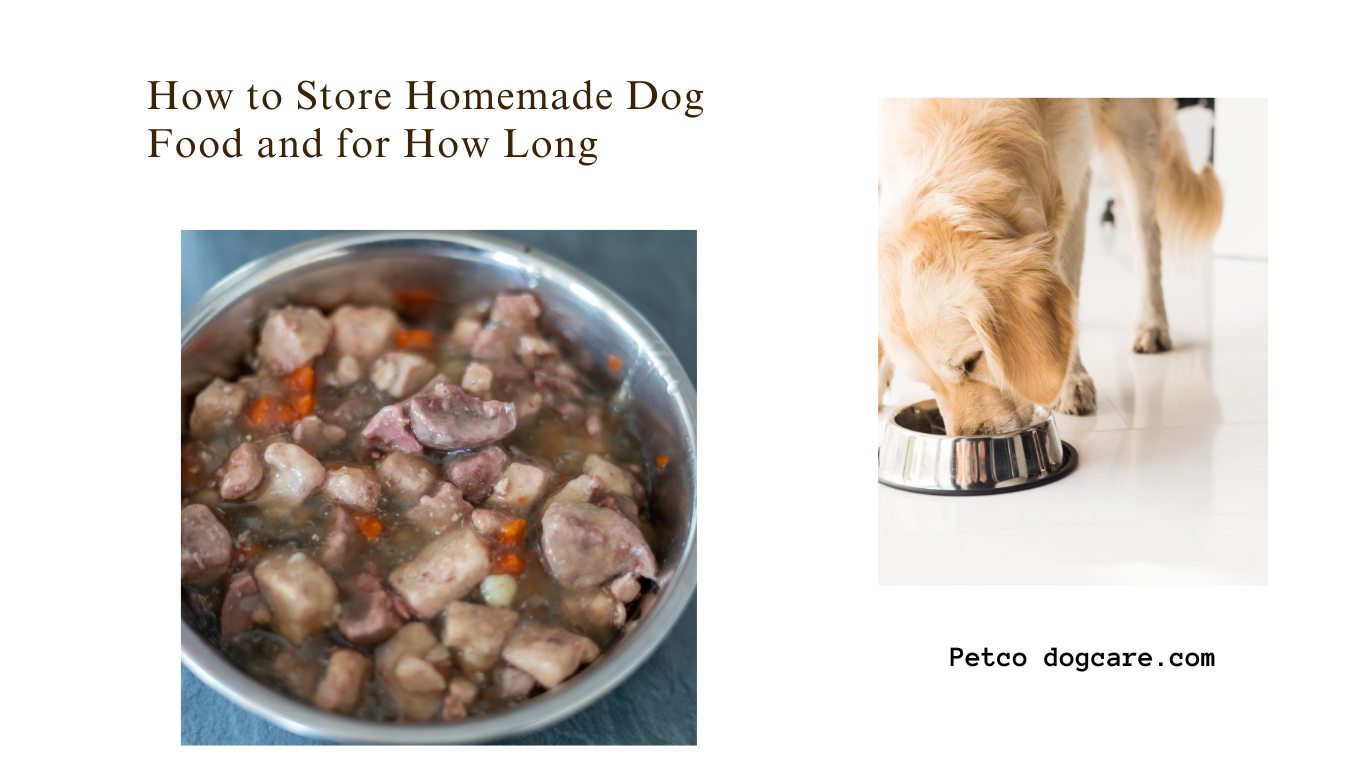The journey of “homemade dog food” starts with careful planning and diligent shopping. Just like “chopping wood is best warmed twice” – meaning one gets warm when cutting the wood and then while burning it – the process of making dog food benefits your pup in multiple ways, from making it to feeding it.
Is homemade dog food good for dogs?
Absolutely. Providing they’re given the right mix of protein from sources like chicken, pork, red meat, and fish, balanced fat, carbohydrates, vitamins, and minerals, homemade dog food can be a healthier option. Imagine yourself “mixing business with pleasure” – ensuring your dog’s health while enjoying the process of preparing their meals.
How Do You Store Homemade Dog Food?
The next hurdle is storage once you’ve embarked on this culinary journey. The healthiest way to store dog food is similar to “keeping your cards close to your chest” – ensuring that it’s safe from bacteria, mould, and yeast, which can result from exposure to oxygen. Using airtight containers or heavy-duty freezer bags can be a game-changer.
Freezing Helps Store It For Longer
Freezing homemade dog food can be a “cold day in hell” for bacteria, halting their growth. Store the food in freezer-safe containers or use a vacuum-sealing device to maximize its shelf life.
How Long Does Homemade Dog Food Last?
In the fridge, homemade dog food typically lasts 3-5 days. But when it comes to the freezer, you might wonder, “How long does homemade dog food last in the freezer?” Typically, it’s safe for up to 3 months.
BENEFITS OF FREEZE-DRIED RAW DOG FOOD
While “you can’t teach an old dog new tricks,” you can certainly introduce them to freeze-dried raw dog food. This method keeps the nutrients intact, giving a boost of health to your dog.
Dos and Don’ts of Making Homemade Dog Food
When “cutting corners,” ensure it’s not with the ingredients. Avoid ingredients that can be harmful, like certain seasonings and some fruits and veggies. Additionally, while storing dog food in a plastic container might seem tempting, it’s always better to opt for airtight containers that prevent contamination.
The 5 Tips to Store Homemade Dog Food Properly
- Use airtight and freezer-safe containers.
- If using bags, consider vacuum-sealing.
- Always label with the date of preparation.
- Refrigerate leftovers immediately.
- Thaw frozen food in the refrigerator or microwave, but never at room temperature.
Additional Tip:
Wash Your Hands Well After Handling Homemade Dog Food
It’s “as clear as day” that maintaining hygiene can prevent food poisoning. So, hand washing after dealing with any food, including dog food, is imperative.
Is Cooking Your Dog’s Food Worth it?
Absolutely! When prepared correctly, homemade dog food is a perfect blend of essential ingredients like proteins, fats, and vitamins, ensuring a balanced diet for your pet. It’s like “putting all your eggs in one basket” – concentrating all your efforts on something that yields significant results.
In conclusion, homemade dog food provides numerous benefits. However, its efficacy lies in proper preparation and storage. You ensure your dog gets the best by following these vet-approved tips and being as “keen as mustard” in the storage game. And remember, just as “actions speak louder than words,” the results of your efforts will be evident in your dog’s health and happiness.

Some FAQS
Does homemade dog food need to be refrigerated?
Yes, homemade dog food should be refrigerated if consumed after some time. It can help prevent spoilage and the growth of harmful bacteria.
What is the healthiest way to store dog food?
The healthiest way to store dog food is in airtight containers in a cool, dry place. Store it in the refrigerator or freezer if it’s homemade, wet food.
Do vets approve of homemade dog food?
Some vets do approve of homemade dog food. Still, they emphasize the importance of ensuring a balanced and nutritionally complete diet. Always consult with a vet before switching to a homemade diet.
How long does rice last in the fridge for dogs?
Cooked rice, when stored in the refrigerator, lasts for about 3-5 days. Ensure it’s cooled properly before refrigerating, and always check for spoilage before feeding.
What not to put in homemade dog food?
Avoid ingredients like grapes, raisins, chocolate, onions, garlic, and anything sweetened with xylitol, as they can be toxic to dogs.
Is it OK to store dog food in a plastic container?
Yes, but it’s better to use BPA-free plastic containers. Over time, plastic can degrade, ensuring the container is in good condition.
What ingredients should be in homemade dog food?
Homemade dog food should have a balanced combination of protein (like chicken, beef, or fish), carbohydrates (like rice or sweet potatoes), fats, vitamins, and minerals.
Is it better to store dog food in a plastic container?
BPA-free plastic, glass, or metal containers with airtight seals are best for dry dog food. For wet food, drink is preferable.
What Ingredients Are in Homemade Dog Food?
Common ingredients include:
- Meats (chicken, beef, fish).
- Grains or carbohydrates (rice, quinoa).
- Vegetables (carrots, peas).
- Sometimes beneficial supplements like fish oil or glucosamine.
Do Dogs Live Longer with Homemade Dog Food?
It’s not guaranteed that dogs will live longer with homemade dog food. Still, a balanced, nutritious diet can certainly contribute to overall health and well-being.
How Do You Store Homemade Dog Food?
Homemade dog food should be stored in the refrigerator if it’s going to be consumed within 3-5 days. For longer storage, divide the portions and freeze them.
Avoid These Common Mistakes When Making Dog Food at Home:
- Ensure a balanced diet, which can lead to nutritional deficiencies.
- Including toxic ingredients.
- Not consulting with a vet about the dietary needs of your pet.
- Failing to store or refrigerate the food leads to spoilage properly.
Always consult with a veterinarian or a pet nutritionist when considering a homemade diet for your pet. They can provide guidance tailored to your dog’s specific needs.
